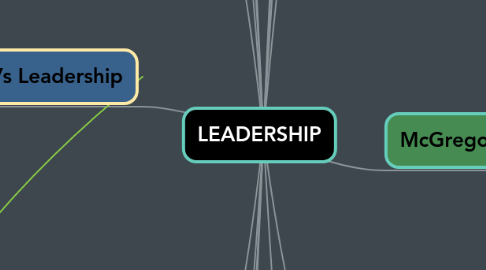LEADERSHIP
Sacha Pollardにより


1. Welcomes leaders to self reflect
2. Traits focused
2.1. Authentic
2.2. Charismatic
3. Behavioural focused
3.1. Transactional v Transformational
3.2. Directive v Participative
4. Servant Leadership
4.1. Followership
5. Blake and Moulton's Leadership Grid (1964)
5.1. Team Management
5.2. Authority - Compliance
5.3. Country Club
5.4. Impoverished
5.5. Middle-Of-The-Road
6. Leadership Development
6.1. Needs analysis
6.2. Evaluation
6.3. Can you Develop a Leader?
7. Ethical Leadership
7.1. Misbehaviour
7.2. Morale
7.3. Power abuse
8. Management Vs Leadership
8.1. Transactional Leadership
8.1.1. Clarifies
8.1.2. Facilitates
8.1.3. Specifies Benefits
8.2. Transformational Leadership
8.2.1. Generates Awareness
8.2.2. Broadens Interest
8.2.3. Stimulates Followers
8.3. Laissez Faire
8.3.1. Indecisive
8.3.2. Uninvolved
8.3.3. Poor Crisis Management
9. Authentic Leadership Luthans & Avolio (2003)
9.1. Self-awareness
9.2. Internalized moral perspective
9.3. Balanced processing
9.4. Relational transparency
10. Unique to the leader, drawing on personal experience.
10.1. Moral reasoning
10.2. Consideration for critical life events
10.3. Promotes relationship building between leaders and employees.
11. McGregors X & Y Theory (1960)
11.1. Theory X
11.1.1. Authoritarian
11.1.2. Hands On
11.1.3. Pessimistic View
11.2. Theory Y
11.2.1. Participative
11.2.2. Ownership
11.2.3. Optimistic View
12. Distributed Leadership
12.1. Conceptual Approach
12.2. Analytical Approach
12.3. Shared & Collective Leadership
13. Leadership Styles
13.1. Autocratic
13.1.1. Command & Control Approach
13.2. Authoritative
13.2.1. Visionary
13.2.2. Follow Me Approach
13.3. Pace-Setting
13.3.1. Results Driven
13.3.2. Do As I Do
13.4. Democratic
13.4.1. Participative
13.4.2. Autonomy
13.5. Coaching
13.5.1. Unblocks Potential
13.6. Affiliative
13.6.1. Supports Emotional Needs
13.6.2. Collaborative
13.7. Laissez Faire
14. Hersey & Blanchard's Situational Leadership (1969)
14.1. Directive Behaviour (Task) and Supportive Behaviour (Relationship)
14.1.1. S1-Directing
14.1.2. S2-Coaching
14.1.3. S3-Supporting
14.1.4. S4-Delegating
15. Challenges
15.1. Leadership as an Attribution
15.2. Substitutes & Neutralisers
15.3. Finding & Creating Leaders
15.4. Trust
15.4.1. Deterrence Based Trust
15.4.2. Knowledge Based Trust
15.4.3. Identification Based

